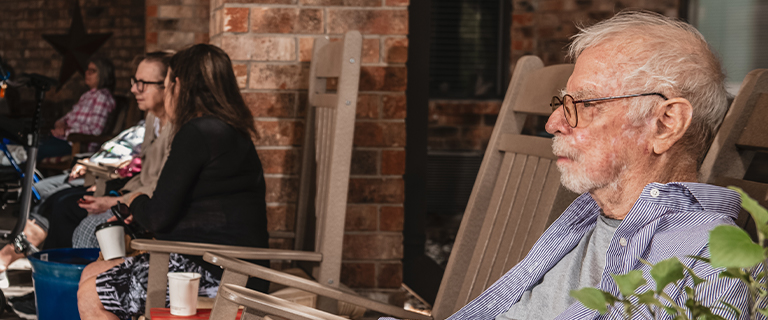Key Takeaways
- Guilt about moving a parent to assisted living is normal and shows how much you care
- These feelings often stem from role reversal, broken promises, and grief over life changes
- Research and honest conversations help you make informed decisions together
- Focusing on positive changes and staying involved helps reduce lingering guilt
- Professional support can help you process complex emotions during this transition
Easing the Guilt of Moving Someone to Assisted Living
Making the decision to move a parent or loved one to assisted living is never easy. This journey is about more than finding the right community. It’s about finding peace of mind for everyone involved. So, families often face a mix of emotions—including worry, sadness, and guilt—as they try to do what’s best.
Your guilt doesn’t mean you’re making the wrong choice. It means you love your parent deeply and want what’s truly right for them. You need to take time to process your feelings in a healthy way so you can move forward with confidence.
Why Moving Parents to Senior Living Feels So Hard
Every family member who considers senior living for a loved one brings their own story and concerns to the table. It’s normal for this decision to feel overwhelming, especially as family roles and routines shift.
The Role Reversal Feels Uncomfortable
You spent decades looking to your parents for guidance, protection, and decision-making. Now you’re stepping into the role of making major life decisions for them, which can feel unnatural and scary. This shift happens gradually for some families and suddenly for others.
Either way, becoming the decision-maker for someone who raised you brings up complex emotions that don’t have easy answers. So, start by acknowledging your own feelings, and take a moment to breathe.
Feeling Like Your Caregiving Efforts Have Failed
It’s common to worry that choosing assisted living means you didn’t do enough. Many caregivers wonder if they should have visited more, spotted warning signs earlier, or managed things differently. But the reality is, as needs change, senior living and care become essential.
Why These Guilt Feelings Are Normal
If you feel guilty about this transition, you’re not alone. In fact, these emotions often mean you’re thinking carefully and putting your loved one’s needs first. Parents and family members who care deeply about each other naturally experience complicated feelings during big life changes.
Your feelings reflect the respect and love you have for your loved one. This emotional struggle is part of making the best possible decision—not something to be ashamed of.
Practical Ways to Work Through Guilt Before the Move
There are healthy ways to acknowledge and process guilt. These are key to helping you support your loved one—and yourself—along the way.
Make the Conversation About Your Worry, Not Their Problems
Instead of focusing on what your parent can’t do anymore, express your concerns about their well-being. Say something like, “I worry about you being alone so much,” rather than “You can’t take care of yourself anymore.”
This approach honors their dignity while opening honest conversations about how to address your concerns together. It positions you as a caring advocate rather than someone taking control of their life.
Build Your Support System Early
Connecting with other families, support groups, or counselors can ease feelings of isolation. Having people to share experiences with makes a big difference during tough times.
Your support network can offer practical advice, emotional validation, and perspective during difficult moments. This is a chance to nurture your own personal growth while supporting your parent through the transition to assisted living.

How to Cope With Lingering Guilt After the Move
Transitioning to assisted living is a journey for both you and your loved one. As everyone adjusts, it’s helpful to focus on small victories and maintain strong connections.
Focus on Small Victories and Positive Changes
Notice when your parent mentions enjoying a meal, making a friend, or participating in an activity they couldn’t access at home. These small victories show that the move is making a positive difference in their daily life.
If you’d like, it helps to keep a journal of these positive moments to remind yourself during difficult days. Your parent’s improved social connections, medical support, or sense of security validates your decision to prioritize their well-being. Seeing these achievements written down can do wonders for easing your guilt.
Give Everyone Time to Adjust to the Change
Adjustment isn’t immediate for anyone. Most residents need several months to feel comfortable in their new surroundings, so stay patient. It’s normal for your parent to feel frustrated or sad in the early weeks, and these feelings may also affect you. Remember, these challenges are part of the process as both of you settle into new routines.
Visit Often and Stay Connected
Your involvement remains important even after the move. Regular visits, phone calls, and participation in community events help your parent feel supported and valued. Spending time with their care team and new friends gives you insight into their experience and creates more opportunities to advocate for their well-being.
When to Consider Professional Support for Your Emotions
Sometimes, the emotions that come with moving a loved one to assisted living can feel overwhelming. If guilt or stress begins to affect your daily life, it might be time to look for extra support. Make sure you’re checking in with yourself often—that’s the key to telling when it’s time to look into professional support for yourself.
Pay attention to signs such as:
- Avoiding visits or feeling unable to connect with your loved one because of guilt or anxiety
- Ongoing feelings of sadness, worry, or frustration that last for weeks
- Noticeable changes in sleep, appetite, or mood that don’t improve on their own
- Struggling to keep up with daily responsibilities or self-care
- Support from family and friends isn’t enough to help you move forward
Prioritizing your emotional well-being gives you the strength to support your loved one and approach this chapter with greater peace of mind. Remember—your needs are important, too.
Find Your Loved One’s New Home
Supporting a loved one through a move to assisted living is a big step. However, it’s a meaningful way to help them enjoy greater connection, comfort, and peace of mind. Every family’s journey is unique, and it’s natural to experience a range of emotions along the way.
At Parsons House Austin, we’re here to guide you through each part of the transition. Our community is built on compassion, understanding, and a commitment to nurturing personal growth for every resident and family. You’re always welcome to visit, ask questions, and see how we celebrate life together each day. Book a tour with us today and see firsthand how we can support your family’s journey together.



